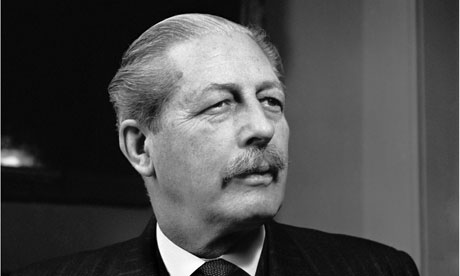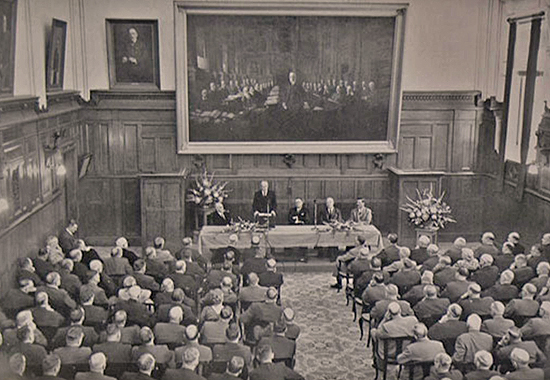GRSJ224:Harold McMillan’s “Wind of Change” Speech and the Start of British Post-Colonialism
Overview
The “Wind of Change” was a speech delivered by then British Prime Minister in Cape Town, South Africa on 3 February 1960. The address was made to the Parliament of South Africa and is considered so important because it signaled the beginning of a major shift in British policy that would ultimately lead to them giving up many of its colonies. It was a process that had previously been started under a Labour government and halted as soon as the Conservatives got back into power, it was considered surprising that the man who ushered in this new era would himself be from the same party.[1]
Background
Britain, in significant financial peril and in the aftermath of the Suez Canal affair, was at this point in severe difficulty and facing a transitional period in the nation’s history. [2] The country could simply no longer afford the administrative costs of continuing to hold onto its numerous territories when many offered no significant practical gains. Historians also note that by the 1960s the idea of Britain as a major world force long had faded and its desire for the prestige of actually having an empire was being overridden by more realistic concerns, thus this was in many ways an inevitable process. [3] In addition to this, there was concern in the United States (at this point becoming further embroiled with its “Cold War” with the Soviet Union) that unhappy citizens in Britain’s various international colonies could be drawn towards Communism as an anti-Western ideology.
The move was considered to be a particularly contentious one due to the fact that two major British run territories in particular – Rhodesia (modern day Zimbabwe) and South Africa – were both dominated by white-run regimes, with African natives having significantly reduced rights and roles in society. [4] The pressure from both sides was considered to be immense, with one observer noting:
“The shadow of apartheid hung over the continent, frustrating at every turn efforts to persuade African nationalists that the west, rather than the Soviet Union, should be their model.”[5]
To add to these serious issues, by 1960 the British government was growing increasingly concerned that there was a growing sense of African nationalism, similar to that which had swelled in Ireland and the United States in previous centuries, and feared that violent clashes would be costly politically, financially and in terms of the physical resources needed to keep the peace. [6]
The Speech
"The wind of change is blowing through this continent. Whether we like it or not, this growth of national consciousness is a political fact"
Harold Macmillan, 1960
MacMillan began by speaking about the world since the fall of the Roman Empire, the rise of nations and people’s strong nationalistic tendencies. These, he argued, have lead people to strive for independence all over the world and that this is a process which continues to take place. Some historians have noted that this served as a precursor to the main reasons for beginning of decolonisation – the Cold War. [7] Some have written that it is too simplistic to put what was an extremely complex decision down to this one factor[8] while also acknowledging the huge importance that Macmillan himself places upon it. A big part of this belief is due to Britain’s growing dependence at this time upon the United States and this was a decision which the US supported both in an ideological and political sense.[9]
Macmillan made a point of aligning South Africa with the Western World, which he portrayed as democratic and opposed to major socialist powers such as Russia and China. The rest of the world, including a freshly decolonised Africa would fall into the middle – but would surely be forced to choose. Part of this speech may have been influenced by the 1956 Egyptian-Indian-Czech pact of non-alliance, which displeased basically all external parties in the build-up to the Suez Crisis.[10] This is the heart of the purpose of decolonisation as imperialist domination of colonies contrasted quite sharply with the war of ideas that Britain was helping to fight in Europe. The perception amongst historians and contemporary commentators alike was that the key idea coming out of the speech was that if allowed to decolonise and democratize the continent of Africa could be added to the side of nations against communism. MacMillan notes, that the number of followers of this ideology has now reached a staggering 800 million. He underlined this point by asking Africans if they will come down on the side of these people or in favour of freedom and order and justice.
References
- ↑ Thornton, A. (1963-1964). Decolonisation. International Journal, Vol. 19, No. 1 , 8.
- ↑ Judt, T. (2005). Postwar: A History of Europe Since 1945. London: Vintage. 294
- ↑ Judt, T. (2005). Postwar: A History of Europe Since 1945. London: Vintage. 293
- ↑ Hurd, Douglas. "Douglas Hurd: Macmillan's Defining Statement of British Foreign Policy." The Guardian. Guardian News and Media, 24 Apr. 2007. Web. 04 Aug. 2016.
- ↑ Hurd, Douglas. "Douglas Hurd: Macmillan's Defining Statement of British Foreign Policy." The Guardian. Guardian News and Media, 24 Apr. 2007. Web. 04 Aug. 2016.
- ↑ O'Sullivan, K. (2006). 'The Wind of Change': Decolonisation in British West Africa. History Ireland, Vol. 14, No. 4 , 40-45.
- ↑ Judt, T. (2005). Postwar: A History of Europe Since 1945. London: Vintage. 296
- ↑ Ovendale, R. (1995). Macmillan and the Wind of Change in Africa, 1957-1960. The Historical Journal, Vol. 38, No. 2 , 457.
- ↑ Ovendale, R. (1995).
Macmillan and the Wind of Change in Africa, 1957-1960. The Historical Journal, Vol. 38, No. 2 , 457. - ↑ Judt, T. (2005). Postwar: A History of Europe Since 1945. London: Vintage. 296

